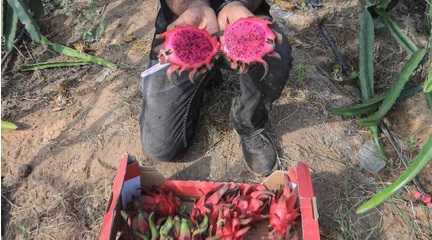
08 August 2023; MEMO: Palestinian Aed Abu Ramadan inspects his dragon fruit plants daily as the time of harvest is here. Though the fruit is not native to the besieged Gaza Strip, Aed has cultivated it and seen it flourish in spite of the difficulties faced by farmers in the enclave.
Aed's nurseries have been bombed by the Israeli occupation forces and Israeli nurseries have refused to sell him seedlings to help his business. While the siege imposed on Gaza means he is unable to export the fruit to regional markets.
"The success of dragon fruit cultivation represents a victory over all of the above, and confirms the ability of the Palestinian farmer to defy the odds despite all the obstacles that the occupation puts before us and prevents us from developing and coming into contact with other farmers around the world," he tells MEMO.
It takes dragon fruit trees three years to bear fruit, he explains, but the health benefits of the fruit are numerous, not least because of the antioxidants they carry which are known to help cancer sufferers, while its high Vitamin C content helps boost the immune system.
He protects his plants with netting to remove the risk of bugs damaging crops, however, this means the pollination process cannot be carried out naturally by bees, so Aed intervenes. "We have to do the pollination process manually, by taking pollen from the male organs of the flower and placing it in the stigma … it must take place in the evening hours … until dawn," he explains, as that is when the plant flowers.




